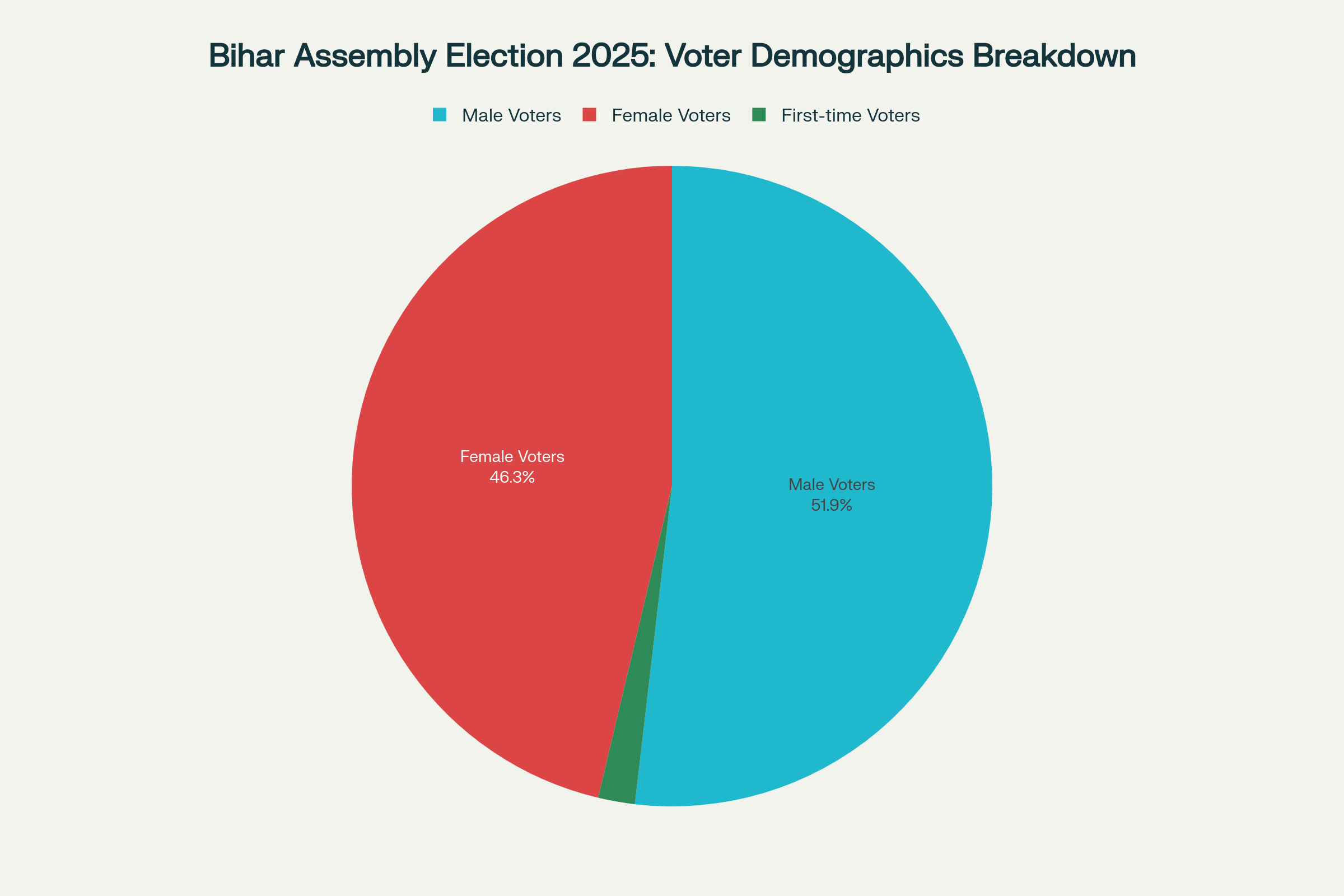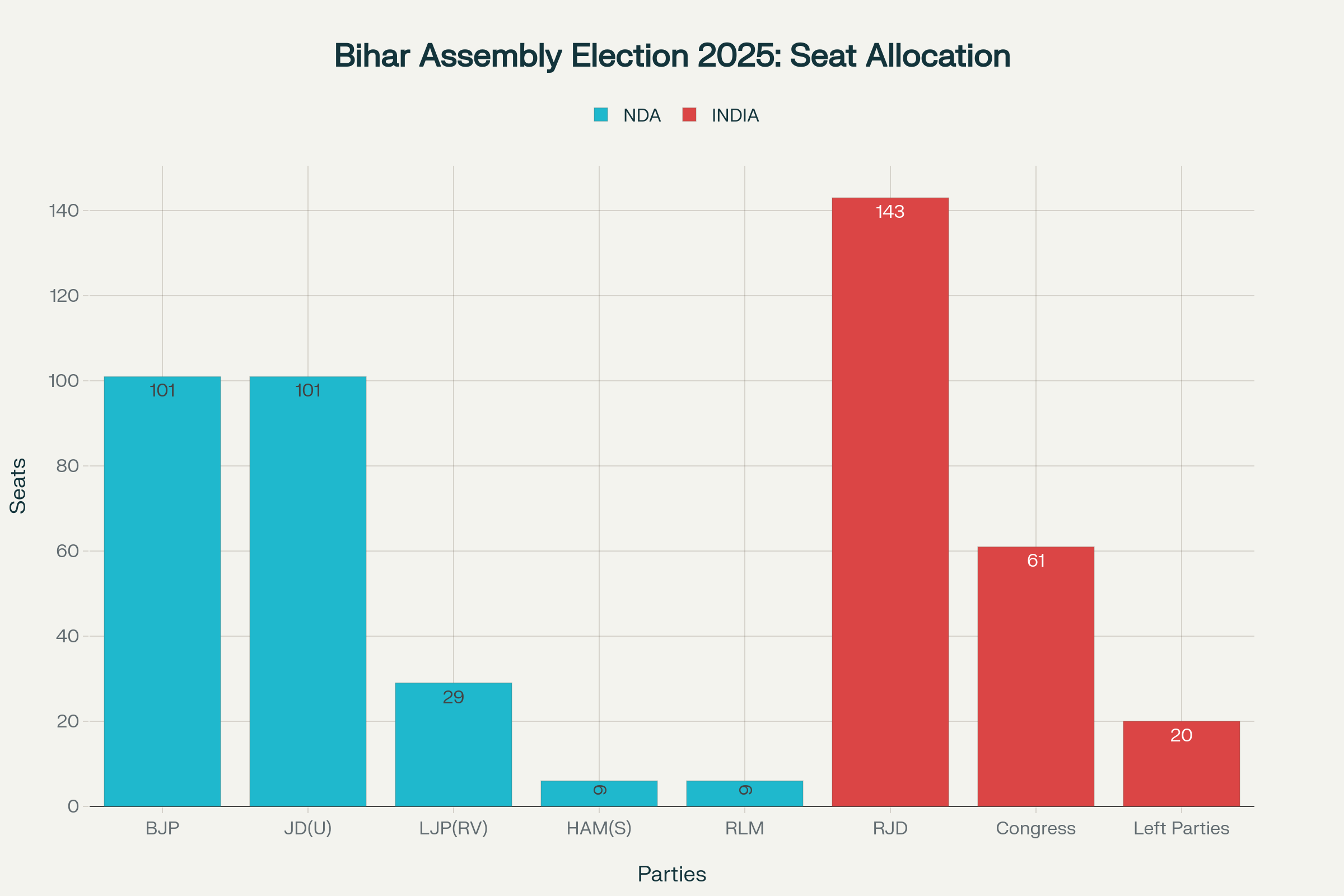Key Highlights:
- JMM drops out of Bihar contest just days after announcing solo campaign on six assembly seats due to seat-sharing disputes with RJD and Congress
- Party accuses allies of “political conspiracy” and threatens to review Jharkhand alliance arrangements with INDIA bloc partners
- Withdrawal highlights broader Mahagathbandhan unity crisis with 11 constituencies facing friendly fights between opposition allies
Alliance Breakdown Threatens Opposition Unity
The JMM drops out of Bihar contest decision has sent shockwaves through the opposition INDIA bloc, exposing critical fault lines just weeks before the crucial assembly elections. Hemant Soren’s Jharkhand Mukti Morcha announced its complete withdrawal from Bihar’s electoral battlefield on October 20, barely 48 hours after declaring it would contest six seats independently. The dramatic reversal occurred as JMM drops out of Bihar contest citing systematic exclusion from seat-sharing negotiations by the Rashtriya Janata Dal and Congress.
Senior JMM leader Sudivya Kumar, who serves as Jharkhand’s tourism minister, attributed the party’s decision to what he termed a deliberate “political conspiracy” orchestrated by alliance partners. The JMM drops out of Bihar contest announcement came on the final day for nomination submissions in the six constituencies the party had originally targeted: Chakai, Dhamdaha, Katoria, Manihari, Jamui, and Pirpainti. Kumar’s stark warning that JMM would “review its alliance with RJD and Congress” in Jharkhand signals potential ramifications extending far beyond Bihar’s electoral landscape.
The controversy underscores deeper organizational challenges within the opposition alliance, where coordination failures have become increasingly evident as JMM drops out of Bihar contest reflects broader patterns of internal discord. Political observers note that such dramatic withdrawals could significantly impact tribal vote consolidation strategies across multiple constituencies.
Seat-Sharing Disputes Trigger Coalition Crisis
The JMM drops out of Bihar contest controversy stems from prolonged negotiations over seat allocation within the Mahagathbandhan alliance, where disagreements have created substantial coordination challenges. According to official Election Commission data, Bihar’s 243-member assembly will conduct polls in two phases on November 6 and November 11, with results declared on November 14. The state’s total voter count stands at 7.42 crore, comprising 3.92 crore men and 3.5 crore women, with 14 lakh first-time voters.
| Bihar Assembly Election 2025: Key Statistics |
|---|
| Total Constituencies: 243 |
| Election Phases: 2 (Nov 6 & Nov 11) |
| Total Voters: 7.42 crore |
| Male Voters: 3.92 crore (52.8%) |
| Female Voters: 3.5 crore (47.2%) |
| First-time Voters: 14 lakh |
| SC Reserved Seats: 38 |
| ST Reserved Seats: 2 |

Bihar Assembly Election 2025 voter demographics showing the distribution across gender and first-time voters among the total 7.42 crore eligible voters
JMM leader Sudeep Kumar Sonu revealed that party representatives had identified 28 seats with significant tribal populations, including 22 constituencies narrowly lost in previous elections. The JMM drops out of Bihar contest decision eliminates potential tribal vote consolidation that could have benefited the opposition alliance in these strategically important constituencies. Sonu disclosed that JMM leaders had received assurances from RJD’s Tejashwi Yadav during an October 7 meeting in Patna, only to be subsequently excluded from final seat-sharing arrangements.
The party’s withdrawal highlights broader organizational challenges within the INDIA bloc, where at least 11 constituencies now face “friendly fights” between alliance partners. As JMM drops out of Bihar contest, political observers note that such internal conflicts could split opposition votes, potentially benefiting the BJP-led National Democratic Alliance across multiple constituencies.
Alliance Tensions Spread to Jharkhand Politics
The JMM drops out of Bihar contest fallout threatens to destabilize the ruling coalition in Jharkhand, where JMM governs alongside RJD and Congress partners. Minister Sudivya Kumar indicated that the humiliation suffered in Bihar negotiations has prompted serious consideration of removing RJD ministers from the Jharkhand cabinet. The party’s leadership views the exclusion as a betrayal of “coalition dharma,” particularly given JMM’s consistent support for RJD candidates in previous electoral cycles.
Kumar emphasized that the JMM drops out of Bihar contest decision reflects deeper structural problems within the INDIA bloc’s coordination mechanisms. He noted that JMM had demonstrated unwavering loyalty to alliance partners, supporting RJD in 2015 and collaborating with Congress, RJD, and Left parties during Jharkhand’s 2024 electoral arrangements. The party’s current stance suggests these historical partnerships may face fundamental reevaluation based on Bihar’s seat-sharing controversy.
| INDIA Bloc Seat Allocation Breakdown |
|---|
| RJD: 143 seats announced |
| Congress: 61 seats allocated |
| Left Parties: ~20 seats (CPI, CPI-ML, CPI-M) |
| JMM: 0 seats (withdrawn) |
| Friendly Fights: 11 constituencies |
| Total Contested: ~224 seats |
The timing of JMM drops out of Bihar contest coincides with increased political maneuvering across both states, as parties position themselves for optimal electoral outcomes. With Jharkhand’s political stability potentially at stake, the controversy demonstrates how regional alliance dynamics can cascade across state boundaries within India’s federal structure when JMM drops out of Bihar contest creates broader implications.
Opposition Unity Faces Electoral Reality Check
The JMM drops out of Bihar contest episode represents a broader pattern of coordination failures plaguing the Mahagathbandhan alliance ahead of crucial assembly polls. Multiple constituencies now feature overlapping nominations from Congress and RJD candidates, creating confusion among local party units and diluting opposition electoral strategies. In constituencies like Vaishali, Lalganj, Kahalgaon, Rajapakad, and Rosera, both major alliance partners have fielded candidates despite attempts at central coordination.

Bihar Assembly Election 2025 seat allocation showing the distribution between NDA and INDIA bloc parties, highlighting the significant presence of RJD with 143 seats and equal allocation between BJP and JD(U) at 101 seats each
Political strategist Prashant Kishor’s newly formed Jan Suraaj party, contesting all 243 seats, adds another layer of complexity to Bihar’s electoral mathematics. The JMM drops out of Bihar contest decision removes one potential variable from this already fragmented opposition landscape, but simultaneously signals deeper structural weaknesses within anti-NDA formations. With the BJP and JD(U) presenting a more cohesive front, each securing 101 seats in their alliance arrangement, opposition divisions could prove costly in closely contested constituencies.
The Election Commission‘s implementation of enhanced electoral procedures for 2025 polls, including stricter candidate verification processes, may influence voter decision-making in constituencies with multiple opposition candidates. As the JMM drops out of Bihar contest controversy demonstrates, alliance management remains a critical factor determining electoral success in India’s multi-party democratic system, particularly when JMM drops out of Bihar contest exposes fundamental coordination challenges.
The NDA’s strategic advantage becomes apparent when considering their disciplined seat-sharing arrangement, with BJP and JD(U) equally distributing 101 seats each, while smaller allies like LJP(RV) secure 29 seats and HAM(S) gets 6 constituencies. This contrasts sharply with the opposition’s chaotic negotiations that led to JMM drops out of Bihar contest and ongoing friendly fights between alliance partners.
Final Assessment
The JMM drops out of Bihar contest controversy exposes fundamental coordination challenges within India’s opposition alliances, highlighting how seat-sharing disputes can escalate into broader political realignments. With Bihar’s assembly elections approaching rapidly, the Mahagathbandhan faces the dual challenge of managing internal conflicts while presenting a credible alternative to the ruling NDA coalition. The ripple effects extending into Jharkhand politics underscore how regional alliance dynamics intersect with national opposition strategies when JMM drops out of Bihar contest creates cross-state implications.
As political parties finalize their electoral preparations, the JMM drops out of Bihar contest episode serves as a cautionary tale about the importance of inclusive alliance management and transparent seat-sharing mechanisms. The ultimate electoral impact of these opposition divisions will become apparent when Bihar’s 7.42 crore voters deliver their verdict across 243 constituencies in November’s crucial assembly polls, particularly as JMM drops out of Bihar contest represents broader alliance management failures.


